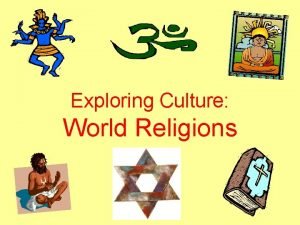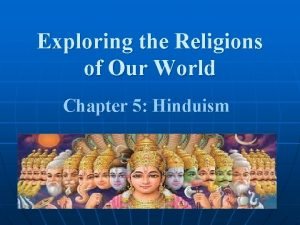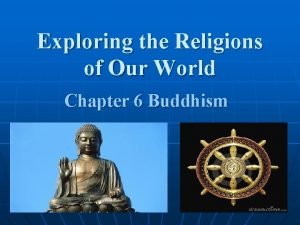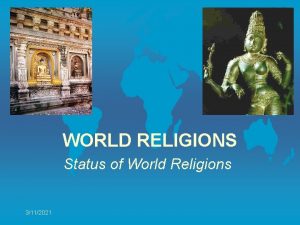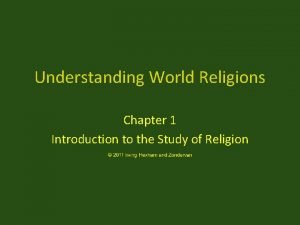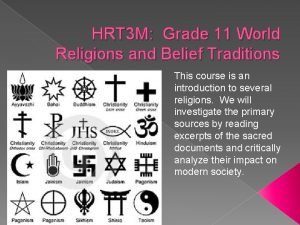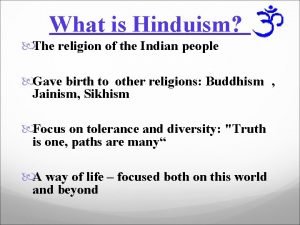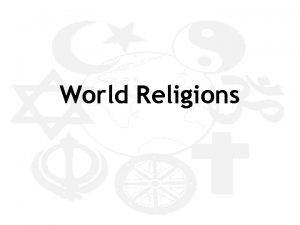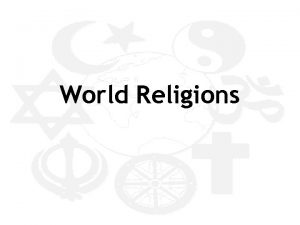Exploring Culture World Religions What is religion Religion

















- Slides: 17

Exploring Culture: World Religions

What is religion? “Religion” comes from the Latin word religare, which means to “to tie”. When people worship, they are tied to the sacred (holy). Religion also ties them to other people which gives them a sense of community. Religion is a set of beliefs concerning the cause, nature, and purpose of the universe. Religions usually involve devotional and ritual observances, and they often contain a moral code governing the conduct of human affairs.

Definitions Moral – having to do with what is right and what is wrong in how a person acts. Example: “John is a moral person because he studied for the test, instead of cheating to pass it. ” Ethical – the study of moral values and rules. Example: “It is not ethical to cheat on a test. ”

Why should we study religion? • The world is very diverse and it is full of different religions and belief systems. • Religion affects people personally, but it can also impact other aspects of culture in a country such as clothing, traditions, food, and laws. • We do not have to agree with what other people believe, but we do need to be accepting and tolerant of other religions and belief systems.

How are religions grouped together? • Monotheistic religions • Polytheistic religions • Philosophies

Monotheism • Monotheistic Religions believe in only one God. Examples: Christianity, Judaism, Islam

Polytheism • Polytheistic religions believe in more than one god or in many gods. Examples: Hinduism The Ancient Greeks and Romans

Philosophies • Belief systems which focus on establishing a specific way of life for people. • Some of these philosophies stress order and structure in society, and others teach that humans should find harmony or oneness in nature. • Examples: Buddhism, Taoism

5 Major World Religions 1. Judaism 2. Islam 3. Hinduism 4. Christianity 5. Buddhism

All of these religions have these important things in common: 1. They all seek to bring comfort to their followers. 2. They all offer thanks for the world’s great beauty and goodness. 3. They all express awe and humility before the mysteries of the universe.


Question #1 Religion DOES NOT affect such things as a. Food b. Clothing c. Railroads

Question #2 Do we need agree with other people’s beliefs? a. No b. Yes

Question #3 Polytheism is the belief in: a. One gods b. Many gods c. No gods

Question #4 Monotheism is the belief in: a. One gods b. Many gods c. No gods

Question #5 Religion is a set of beliefs concerning the cause nature, and purpose of the universe. a. True b. False

Question #6 The Ten Commandments is an example of stating what is right and what is wrong. One who follows them is said to have good: a. Strength b. Ideas c. Morals
 Polytheistic religions
Polytheistic religions Exploring religions chapter 5 large
Exploring religions chapter 5 large Judaismn
Judaismn Exploring the religions of our world chapter 1 pdf
Exploring the religions of our world chapter 1 pdf Exploring the religions of our world
Exploring the religions of our world Exploring the religions of our world
Exploring the religions of our world Exploring religions chapter 4 large
Exploring religions chapter 4 large China 300 bc
China 300 bc Map of world religions
Map of world religions Geography and culture of christianity
Geography and culture of christianity World religions percentage
World religions percentage World religions chapter 1
World religions chapter 1 Grade 11 world religions
Grade 11 world religions Religions that believe in reincarnation
Religions that believe in reincarnation Junius hardy
Junius hardy Religions of the world
Religions of the world Religions of the world
Religions of the world What is hinduism
What is hinduism
